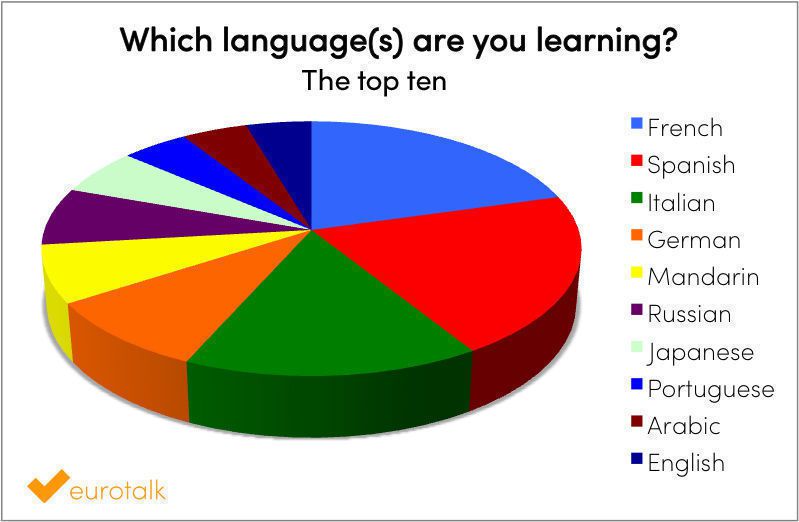How do you choose which language to learn?
Everyone’s always talking about how useful it is to speak another language – and they’re right, for so many reasons. There’s lots of advice too on how to get started and how to stay motivated when it gets tough. But the first question any aspiring language learner should ask themselves is, ‘Which language do I want to learn?’
Sometimes this is easy, because you’re moving to another country, or you’ve met a new partner who speaks a particular language. Even if this means you end up learning a language most people would consider unusual, to you it has a purpose and that makes it anything but obscure.
But what if you’ve just decided you want to learn a language, because you’ve heard that people with a second language earn more, or that learning a language makes you cleverer, and don’t have a particular one in mind?
 At EuroTalk, we offer nearly 140 different world languages. It’s a pretty daunting selection to be greeted with when you’ve just Googled ‘I want to learn a language’ and stumbled on to our homepage, or downloaded the uTalk app. And that doesn’t even come close to the total number of languages spoken in the world. So how is anyone meant to choose one to learn? Do you just close your eyes and point at one?
At EuroTalk, we offer nearly 140 different world languages. It’s a pretty daunting selection to be greeted with when you’ve just Googled ‘I want to learn a language’ and stumbled on to our homepage, or downloaded the uTalk app. And that doesn’t even come close to the total number of languages spoken in the world. So how is anyone meant to choose one to learn? Do you just close your eyes and point at one?
Well no, we don’t recommend that approach; you could end up with something really fun that way, but at the same time, learning a random language just for the sake of it, when there’s very little chance you’ll ever get a chance to speak it, seems a shame. Half the fun of learning a language is getting to share it with other people.
So here are our recommended criteria for choosing a language:
Number of speakers
Generally, a language with more speakers is going to be more useful to you, because you’re going to have more opportunities to speak it. According to Ethnologue, the top five most spoken languages in the world are Chinese, Spanish, English, Hindi and Arabic, with a total of 2.4 billion speakers between them, so knowing one of these languages is going to guarantee you lots of people to talk to.
On the other hand, it depends on your reasons for wanting to learn a language. If it’s to make friends all over the world, one of these five languages will stand you in good stead. But if it’s to improve your employment prospects, bear in mind that you might face more competition if you’ve chosen a popular language. I studied Spanish at university, which is in great demand with employers. But so did lots of other students. We’ve got five people who speak Spanish at EuroTalk – two of them are native speakers (there are less than twenty of us in total, to put that in context) so it’s rare for me to be called on to use my language skills. Something like Portuguese or Japanese, which are still in the top ten in Ethnologue’s list, might offer fewer opportunities but when one comes along, you’re probably not going to face as many rivals for the job.
Where it’s spoken
Another important factor. Firstly, you don’t want to learn a language that’s spoken in a country you never intend to go to, or in which you’ve no interest. Secondly, some languages, like French, Arabic or English, are spoken in many different countries. So if you’re going travelling and want a language you’ll be able to use in more than one place, one of these will be more useful to you. But if travel’s not top of your agenda, this might not be such a big consideration.
Similarity to other languages
Most world languages are organised in families, which means they come from the same root as the other languages in that family. This means often, although you may only speak one language, you can probably at least make yourself understood in another. Hindi and Urdu, for example, are mutually intelligible, as are Czech and Slovak. If you know Spanish, you can make a reasonably decent attempt at Portuguese or Italian, and although you might make a few mistakes, chances are you’ll be understood. I’m not suggesting you should go around speaking the wrong language at people, but if you do make an honest slip-up, or just can’t think of the right word, you’ll probably be ok. I’m fairly sure I spoke quite a bit of Spanish when I was in Italy earlier this year, but everyone seemed to understand what I was getting at.
Some languages, though, don’t have any close neighbours, or indeed any neighbours at all. Basque, for example, is what’s known as a language isolate, as is Korean. This means they don’t belong to a family, but stand alone, so if you’ve chosen one of these languages, it’s worth remembering that it won’t help you with any others.
Your interests
Partly, this is to do with your travel interests. If you’ve a particular interest in Russia, for example, we’d recommend you learn Russian. But even if you’re not particularly interested in travelling, there are other things to consider. Are you a fan of opera? Maybe give Italian a go. Anime? Japanese. Star Trek? Klingon.
Or maybe you’ve got a particular interest in endangered languages, in which case you might want to learn Cornish or Sardinian, not necessarily for the wealth of communication opportunities it offers, but to help save a valuable world language from extinction.
Your commitment
You know yourself better than anyone. How motivated do you feel? Is this just a passing whim that you’re likely to give up the moment it gets difficult, or are you prepared to stick at it? The fact is, some languages are harder than others, and this is different for everyone, depending on your native language. For Europeans, Dutch is considered quite an easy language to learn, while Mandarin Chinese is very difficult. But someone living in Japan may find Chinese much easier to learn than any European language.
So if you’re living in Europe and intending to learn Mandarin, you’ll need to be pretty dedicated. And if you know you don’t have it in you, it might be better to try something else rather than face disappointment when it doesn’t work out. Nobody’s bad at all languages – you just need to find the right one for you.
If you’re still undecided, and in need of some inspiration, take our quiz – it’s not at all scientific, but might give you some ideas!
Or even better, why not try a few out? You can do this for free on our website, or by downloading uTalk for iOS.
If you have any other tips or suggestions for readers trying to choose a language, please share them in the comments.
Liz
Quote of the week: 9 Aug 2014
“You miss 100% of the shots you don’t take.” Wayne Gretzky
For more like this, find us on Pinterest.
Embed This Image On Your Site (copy code below):
Which language are you learning? The results!
We had a great response to our recent language learning survey; thank you to everyone who took the time to complete it. First things first: we’re delighted to announce that the winner of the iPad mini prize draw is Konstantia Sakellariou. Congratulations, Konstantia – your iPad is on its way!
We wanted also to share a few of our findings with you. Some of the results from the survey were as we expected, others were quite surprising. Here are just a few of the things you had to tell us. Thanks again for all your thoughtful responses, we’ll put them to good use.
Which language(s) are you learning (or would like to learn)?
The first question was pretty straightforward. A couple of people ticked every language on offer (over 100) – now that’s what we call ambition! – but most chose between 1 and 5. Here are the top ten most popular languages:  Other popular choices included Greek, Swedish, Dutch, Brazilian Portuguese, Norwegian, Irish, Polish and Icelandic. We also got some requests for languages we don’t yet offer, like Guernésiais and Twi – we’ll do our best to add those languages to our list, so watch this space!
Other popular choices included Greek, Swedish, Dutch, Brazilian Portuguese, Norwegian, Irish, Polish and Icelandic. We also got some requests for languages we don’t yet offer, like Guernésiais and Twi – we’ll do our best to add those languages to our list, so watch this space!
Why are you learning a language?
Next, we wanted to know why you’re learning a language. Nearly half of the respondents chose travel as a reason, and almost as many said they were learning a language just for fun. 36% of respondents said it was for family reasons or for a relationship, and 27% for work. The results were quite evenly split though, showing that there’s no one overwhelming reason – everyone has their own motivation.  Among the other reasons, we had a range of answers, including an interest in the culture of the language, personal challenge and wanting to follow literature, film and music in other languages. Many people are living in another country, which was their main motivation for learning the local language. And one person said that their heart asked for the knowledge, which we loved 🙂
Among the other reasons, we had a range of answers, including an interest in the culture of the language, personal challenge and wanting to follow literature, film and music in other languages. Many people are living in another country, which was their main motivation for learning the local language. And one person said that their heart asked for the knowledge, which we loved 🙂
What prevents you from learning a language?
We were also interested to know what stops people from learning a language, so we asked you to rate the following reasons out of 5. The most common barrier to learning is a lack of time, followed by not having found the right method, and then the cost involved.  Incidentally, if you’re facing any of these barriers, you may like to check out our recent posts, on finding time to learn a language and learning on a budget. And if you’re looking for resources, did you know you can try out the EuroTalk learning method for free? Either visit our website, or download our free app, uTalk for iOS, to give it a go. We believe learning a language should be fun, because our research shows we learn much better if we’re enjoying ourselves, and this in turn makes it a lot easier to overcome the obstacles that get in the way. See what you think! Other answers included not having an opportunity to use the language, a lack of motivation and difficulty finding resources for the particular language they wanted to learn (we may be able to help there – we’ve got 136 languages and counting…).
Incidentally, if you’re facing any of these barriers, you may like to check out our recent posts, on finding time to learn a language and learning on a budget. And if you’re looking for resources, did you know you can try out the EuroTalk learning method for free? Either visit our website, or download our free app, uTalk for iOS, to give it a go. We believe learning a language should be fun, because our research shows we learn much better if we’re enjoying ourselves, and this in turn makes it a lot easier to overcome the obstacles that get in the way. See what you think! Other answers included not having an opportunity to use the language, a lack of motivation and difficulty finding resources for the particular language they wanted to learn (we may be able to help there – we’ve got 136 languages and counting…).
How have you used your language when travelling?
Finally, we asked how knowing another language has been useful when you’re travelling. There was no clear winner here, which just goes to show knowing a language is always useful! But the top response was that it gives you the ability to talk to locals in their own language; many people added that they felt more welcome as a result and that it gave them independence so they could make the most of their trip. There were lots of practical reasons too, with getting around and eating out narrowly beating shopping in the poll. If you missed out on the survey this time, don’t worry – we’re planning another one soon, so keep an eye on the blog (you can subscribe by email above to get the latest updates), or follow us on Facebook or Twitter. And if you didn’t answer this survey but would still like to have your say on any of the questions, you’re very welcome to email us or add your thoughts in the comments below.
If you missed out on the survey this time, don’t worry – we’re planning another one soon, so keep an eye on the blog (you can subscribe by email above to get the latest updates), or follow us on Facebook or Twitter. And if you didn’t answer this survey but would still like to have your say on any of the questions, you’re very welcome to email us or add your thoughts in the comments below.
Liz
Data above based on 877 survey responses.
Translation mistakes – not just for laughs
Today we have a guest post from language company, thebigword, on famous translation mistakes, some of which had serious consequences. Mistakes are common, and to be expected, when you’re learning a language – but when it really matters, it’s important to get it right!
Over the years there have been many translation ‘slip ups’ and faux pas, and whilst the mistakes may seem funny some can have a far more serious impact. Reputable language solution agencies such as thebigword, specialise in international translation and you can bet your bottom dollar that they wouldn’t be caught making slip ups like the following.
There have been many incidences over the years where mis-translation can go from highly amusing to potentially life damaging. For example, Mead Johnson Nutritionals in 2003 had a case raised against them when 4.6 million cans of baby food had to be recalled. The translation error, which was caused by effectively being lazy, meant that the prescribed recipe translated into Spanish could have caused massive health issues, according to the U.S. Food and Drug Administration.
 Businesses and the world financial markets have also paid the price at the hands of poor translation, most notably when the price of the U.S. dollar was sent spiralling after an incorrect translation of an article by Guan Xiangdong for the China News Service. Guan’s original piece was meant to be a speculative overview of a series of financial reports, but instead it was translated in a more aggressive tone, which ultimately made readers in the U.S. think it was an authoritative warning and they should move their money and sell shares.
Businesses and the world financial markets have also paid the price at the hands of poor translation, most notably when the price of the U.S. dollar was sent spiralling after an incorrect translation of an article by Guan Xiangdong for the China News Service. Guan’s original piece was meant to be a speculative overview of a series of financial reports, but instead it was translated in a more aggressive tone, which ultimately made readers in the U.S. think it was an authoritative warning and they should move their money and sell shares.
The Chicago Tribune published a highly shareable article not that long ago when it collated a series of images captured by tourists on their worldly travels. Examples from China included, ‘man toilet’ and ‘The government decides to cracking down fakes intensively for another three years’. However, our favourite has to be, ‘Because there is the situation when a step is bad, please be careful’. We’re pretty positive that was meant to say ‘mind your step’.
Of course, no faux pas goes unnoticed in the world of marketing, where language on billboards or even newspaper advertising isn’t missed by the most ardent observer.
The popular Dairy Association campaign, ‘Got Milk?’, raised an eyebrow or two when in Mexico it was translated to ‘Are you lactating?’ And in France, Colgate produced a new range of toothpaste called Cue; little did anyone realise that it had the same name as a well-known adult magazine. Now that is what we call a faux pas!
Do you have any favourite translation errors? Please share them in the comments below.
10 reasons to visit… Edinburgh
I’m just about to go back to Edinburgh for my final year of university after having spent some time away from the city. I am determined to tick all of the touristy attractions off the list that make the ‘burgh a worthwhile destination, because it’s so true that when you live somewhere you don’t necessarily take advantage of the opportunities for adventure around you. Here are 10 must-sees that I have managed to experience – I wonder how much the list will have changed by this time next year!
1. Edinburgh Fringe Festival
Each year, around August time, a transformation takes over the city: almost every shop, every bar, every open space is descended on by the Fringe Festival: the biggest arts festival in the world. The first time I went I genuinely couldn’t believe the change that had come over the place I’d been living in for almost a year. There are people everywhere showcasing what they do and love best, whether that is interpretive dance or black comedy, street performance or orchestral ensembles. Some shows are free, others need to be booked far in advance, but I encourage you to go for something off the wall – with so much on offer, a disastrous morning performance can be forgotten with an incredible afternoon show!
2. The Royal Mile
This stretch of road runs from the iconic Scottish battlement that is Edinburgh Castle, to the Palace of Holyroodhouse, the official residence of the British monarch in Scotland. Both of these are highly recommended as places to visit, although I’ve not been to the Castle yet, as part of a university superstition. The Mile itself is flanked by terraces and shops, as well as street vendors and tours offering to show the horrible histories of the Windy City. There are also some great secret passages and alleyways that lead down to Princes Street via the Princes Street Gardens.
3. The National Museum of Scotland
Taking up almost the entirety of Chambers Street, including a controversial extension that holds the Museum of Scotland exhibits, The National Museum has a huge collection of artefacts from across the centuries. Although there are some temporary exhibitions that you have to pay for, you are free to roam around the majority of the museum. My personal favourite is the animal installation that spans three floors.
4. The Grassmarket/the Cowgate
Edinburgh is built on many different levels, and you can be forgiven for getting lost and confused with the topography of the city. Just down from the Royal Mile, the Grassmarket and the Cowgate are ideal locations for a good bite to eat and a drink (or two). There are quirky shops to be found cheek by jowl with hostels and cafés, as well as a few clubs if that’s what you’re looking for.
5. Arthur’s Seat
It’s not a hike, but an energetic walk, and the spectacular view from Arthur’s Seat to the hills, across the sea and out over to Fife is a definite must. It’s a perfect opportunity to take in the whole city, and get to grips with the wind!
6 – 8. Stockbridge
(6) Stockbridge Market on a Sunday is adorable: local produce, friendly people and all sorts of delectable goodies. There are also some lovely cafés in the area.
(7) If you’re in Stockbridge anyway, take a walk along the Water of Leith, which leads from Pentland Hills to the Forth of Firth at Leith. I’m not suggesting you tackle all 24 miles, but it makes for a different view of the city and a retreat from the hustle and bustle of the centre.
(8) The Royal Botanical Garden was founded in the 17th century, and continues to educate and explore to world-renowned status. It comprises four gardens and boasts an impressive collection of plants.
9. The Zoo
Now I’m not sure if you’ve heard, but they’ve got pandas. As well as these adorable, rare creatures, the zoo boasts the UK’s only koalas and an impressive ‘Discovery & Learning’ program for kids. If you can organise your trip for the right time, the Penguin Parade is a site for sore eyes, and other talks throughout the day are fascinating. The zoo is easily reachable by bus from Waverly Train station.
10. The Meadows
The University of Edinburgh area around Bristo Square and George Square backs onto The Meadows and further over to Bruntsfield Links. It’s a lovely spot for a little picnic or afternoon nap, and there’s sure to be people BBQ-ing too. Due to it being a student hub, you could also try out some of the lunchbox-sized lunch venues that won’t break the bank.
Have you visited Edinburgh? Share your own suggestions and tips in the comments for anyone planning a trip.
Lucy
PS Because this is a language blog, we felt we should add a footnote – English is the official language of Scotland, although it sounds a little different from the ‘Queen’s English’ spoken in much of England, particularly the south. Scotland also has two regional languages: Scottish Gaelic and Scots. You can learn Scottish Gaelic now with uTalk; watch this space for Scots!




